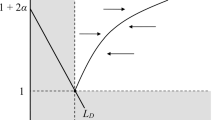Summary. Short-term contracts and exogenous productivity growth are introduced in a simple wage bargaining model. The equilibrium utilities corresponding to militant union behaviour are independent of the contract length. Necessary and sufficient conditions for monotonic convergence to a unique steady state are derived. Otherwise, cyclic behaviour of wage shares is inevitable. A wage decrease can occur if strike is credible, but never when strike is not credible. In the limit, as time between bargaining rounds vanishes, this paradox survives.
Similar content being viewed by others
Author information
Authors and Affiliations
Additional information
Received: September 3, 1998; revised version: February 10, 2000
Rights and permissions
About this article
Cite this article
Houba, H., van Lomwel, G. Counter intuitive results in a simple model of wage negotiations. Econ Theory 17, 81–99 (2001). https://doi.org/10.1007/PL00004104
Issue Date:
DOI: https://doi.org/10.1007/PL00004104




